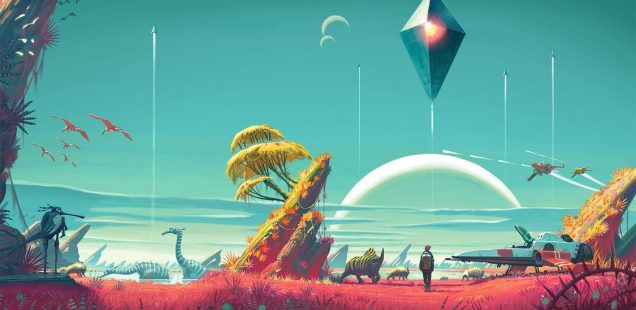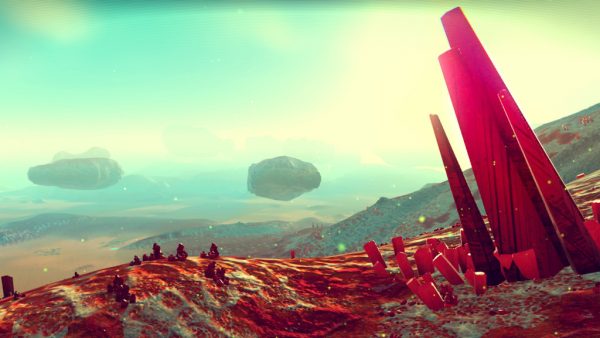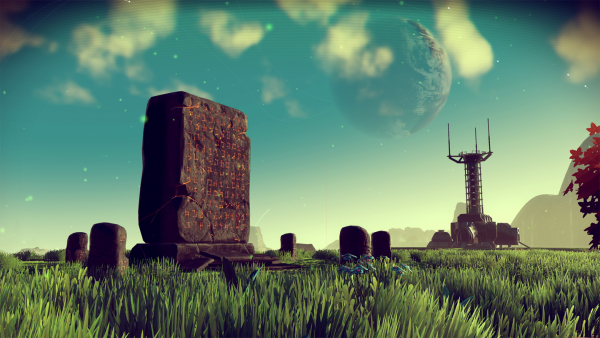
Due Diligence and the Infinite Sadness
Today is the greatest day Leigh Harrison has ever known.
When I was at university, one of my professors tried to assuage the anxieties my new academic home had brought about. She wanted me to see that at best we only ever have momentary control over our lives—what we do with them, our ultimate legacy. And that at worst, well, we never have any control at all, so best not to get too hung up.
To illustrate this, she told me of an Aristotle quote (“The endless heavens obscure timeless, silent sorrows”), that years later would inspire Byron’s 1816 poem Darkness, particularly the phrase “But only for the boundless veil of space, does the screaming sorrow of man go unheard”. That line, which was ultimately discarded anyway, was apparently seen by graphic designer Philip Gips at a London exhibition in the early 1970s, and would go on to inspire the now iconic tagline to Alien: “In space no one can hear you scream.”
You can draw a line right through two millennia of history, beginning at one of classical antiquity’s greatest minds, and ending up at the poster for a Ridley Scott monster movie. You just couldn’t make it up.
Upon hearing this story, I began to finally understand the freewheeling chaos of existing. That we often find ourselves as bit players in our own lives, merely following the stage directions of some unseen, all powerful hand, who once in awhile allows us a brief ad-lib to keep us happy.
I’ve felt this same sensation playing No Man’s Sky. With its unfathomably vast, largely empty galaxy, containing nothing much more than perpetual boredom and isolation, it has further helped me understand my cosmic insignificance. I don’t for a minute think it was supposed to elicit these feelings, but I find it to be a triumph of existential dread and an exercise in self-liberation.
Like the recent Master of None, The Lobster, and Science Fiction, I see in No Man’s Sky an unflinchingly honest interrogation of what it means to be alive. It turns our gaze toward how we spend our time, what we hold important—who we are, so we can reevaluate it all through the lens of none of it (and nothing beyond it) mattering at all. To play it is to open oneself up to the sort of self-scrutiny few would ever choose, which I suspect goes some way to explaining its divisiveness—that and it being a terribly boring, terribly repetitive, and terribly paced experience. It is unfriendly to its last breath, but I suppose I found some solace in its emptiness, where so many just found a void.

No Man’s Sky truly is a game of and about nothingness, and in being thus, it inadvertently asks us to countenance our own utter insignificance. As you’ve likely heard, it is set in a procedurally generated galaxy of 18 quintillion (1.8×1019) planets, where the player is required simply to survive and explore. A typical play session involves mining resources to keep your exosuit, multi-tool mining beam and ship powered, while stockpiling enough additional plunder to sell. Currency is used to buy upgrades, letting you stay alive longer, mine more efficiently, and pilot ships with larger inventories. A gameplay loop soon calcifies, as successful resource gathering and sale lead to a marginal (it’s small) improvement in efficiency. You mine a bit faster, carry a few more resources at once, and thus make more money when sell everything to a vendor. It’s a slow process that sees your earning capacity steadily increase over tedious cycles of clockwork repetition.
There are many, many guides that detail how best to maximize efficiency in this regard, but they all make the error of approaching No Man’s Sky like any other videogame: as if it were a challenge to be bested. While a bigger inventory and faster mining beam will undeniably allow one to gather more Iridium or Zinc more quickly (and therefore make more money more quickly), there really is no victory to attain by doing so. The game doesn’t hit a congratulatory message and credits reel when the player maxes out their exosuit, starship, and multi-tool inventories. It just keeps going. Forever.
By virtue of its sheer size, No Man’s Sky channels the hopelessness at the heart of the human condition. Even if you could visit one of its planets every second, it would take 5 billion years for you to see them all. A lot of them have moons as well, so, you know—it’s not happening, basically. The game can’t be won in any conventional sense, however much you try. It can only be endured.
Its scope makes every aspect of it essentially meaningless. Beyond the arduous repetition inherent with procedural generation on this grand scale, where the sheer randomness of everything spreads an uncanny pall of similarity, the almost infinite permutations render every occurrence impotent.
On my first planet I stumbled upon a powerful multi-tool for sale (one that would have greatly improved my resource mining ability), for the paltry sum of 85,000 credits. I didn’t have the funds at the time, but thought I’d return later to grab the goods when I had more cash. That would prove to be absolutely out of the question.

Planets are huge for videogame spaces, and No Man’s Sky is explicitly designed to prohibit map-based navigation or player-designated waypoints. Given the size of the environments, you are only ever able to pay mind to your immediate surroundings. Poke around for a time, mine for things you need, then move on. Walking is very slow going, so you’ll pop into your starship and zoom in a direction for a few miles, then explore some more. Even at such close proximity, finding a way back to even your last landing zone without navigation assistance is unlikely, and so the game effectively teaches you live in the moment, to constantly plow onwards, because going back is near impossible.
No Man’s Sky deconstructs the temporal and spatial norms of game design, framing our actions not in the context of a single level or battle—or even a single videogame—but as a chaotic, cumulative experience that extends forever. Mistakes and mortality don’t really matter. It’s possible to get rutted to death by an angry plant, or robbed blind by space pirates, or land on a planet made entirely of fire, pus, and killer off-brand Daft Punk aliens, but no tangible, lasting harm ever occurs. You may lose some resources upon death, but in a game world too vast to ever fully explore, that’s filled to the end of time with those same resources, this can’t be called a penalty in traditional videogame vernacular. You merely die, respawn, and continue. Like its galaxy, No Man’s Sky’s gameplay loop exists in perpetuity.
With no game over, every error is just personally acknowledged and moved on from—catalogued in the same way as all the procedurally generated cat-headed armadillos and phallic mountains. You live with the consequences of your actions in the moment and for as long as you’re willing to endure the game, but given its infinite scope, you could theoretically experience every variation of every possible variation of every possible variation possible. Nothing you do, dying included, matters all that much.
This is where I find the catharsis my professor spoke of back in E16: No Man’s Sky simultaneously offers everything and nothing at all. Infinity sounds great in theory. But when we’re actually offered it, when we’re stood on the precipice of ceaseless possibility, staring into the abyss of our own never-ending existence, it’s not difficult to shy away and wither at the thought of going on forever.
Life is hard enough as it is. One with the scope for boundless pleasure and pain would be unbearable. Looking at it nihilistically, the game seems to reinforce this—with all the subtlety of a boot stamping on a human face—in its ending. If you beat the game and make it to the center of the galaxy, as its vague-ass storyline asks you to, your reward for the 50+ hours spent getting there is being spat out to the fringes of a whole new galaxy, to begin the journey again. There could be no more fitting an ending for a game that can be said to channel, unintentionally or otherwise, the ultimate futility of being alive. I don’t think you are ever meant to get to the center of the galaxy, that doesn’t seem to be the point of the game—I don’t think there actually is one beyond its impressive procedural generation technology. But if you do reach the center, well, just get back to it.

The lonely expanse of No Man’s Sky perfectly captures the existential dread of making our way through life. It is singularly representative of contemporary living—nothing we ever do really matters, in the grand scheme or otherwise. The endless options that amount to nothing tangible. The infinite distractions that all boil down to a handful of activities and outcomes. The steady repetition that builds to more steadily building repetition. No greater metaphor exists for Western life in the 21st century than No Man’s Sky.
Its asinine gameplay loop of mining and selling exemplifies the conflict lying within each of us. We can go to so many places and see so many wondrous things, but when we get there, and certainly after a short while, we find it’s hardly different to where we just left. So many options, but so few appreciably different results.
Dinner. Drinks. Hookups. Freelancing. Shitposting. Tinder. Bumble. Spotify. Insta. Marriage. Mortgage. Backpacking. Children. Gin tasting. Farmers market. Fresh eggs. Craft beer. New Job. Same job. No job. Fisherman. Drystone waller. Liguria. Tuscany. Siberia. Leeds. Clean living. Shakes. Pulses and beans. Booze. Fags (I’m British, remember). Shots. Old vices. New mistakes.
Things in our real lives matter more than the mundanities of No Man’s Sky, of course. But on a cosmic scale, not really. As with all those tantalizing options, most everything in life leads to the same places: being happy, being sad, or being dead. If I didn’t live where I live now, I’d live somewhere else. If I didn’t work where I work now, I’d work somewhere else. If I hadn’t been fired and escorted from my job in 2010 (a great day, I went to Parliament Hill), I would never have met my wife. Perhaps she’d be married to someone else. Perhaps I would. Do I mine Iridium today, or Zinc? Upgrade my exosuit, or my multi-tool? It’s all, as the stars see it, largely one and the same.
As agonising as it is playing No Man’s Sky, its breadth and apathy also grants absolution. In offering us a thankless infinity to inhabit, filled with the sort of copy/paste activities that litter our real lives as much as its own galaxy, it allows us to put an end to the destructive “what if?” that permeates life. Its answer of “everything, always” makes a mockery of anxious caution. Literally anything can and will happen within the narrow confines of finding/maintaining love, making money, trying to be happy, and the life-long repetition inherent in those pursuits. The only input we really have is to make the choices that set in motion all that follows.
If Ashton Kutcher taught me anything (and he’s taught me a lot), it’s that joy, pain, hurt, guilt, and all the rest will follow us around wherever we go. While we can never escape them, we can at least, perhaps, choose what form they take, and whose tear-filled eyes stare back at us through the darkness. This realization of our ultimate helplessness can petrify us, or we can willingly submit to the dispassionate dice rolls of existence. The choice is ours. It’s all we’ll ever have.
Life is really quite hard—full of pitfalls, pain and abject misery. Witness that stretching out forever, as in No Man’s Sky, and you soon see that it’s worth perhaps savoring the good times all the more. We’re never truly in control of anything, no, but we can at least steer the ship as best we can, content with the knowledge that wherever it ends up taking us, the journey’s all there really is.